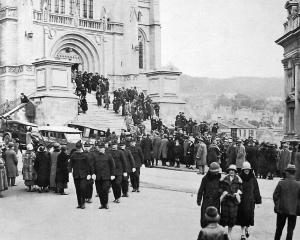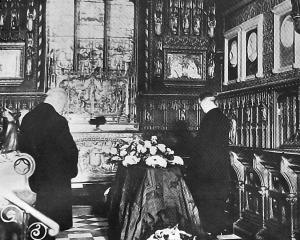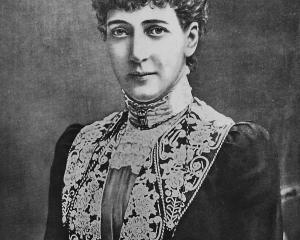
There he found many pounds of haggis for sale, and, being in a venturesome frame of mind, purchased a pound or two.
He proudly conveyed the unusual edible to his wife, and next day it occupied a prominent place on the dinner table.
When the haggis had been served round and the first mouthful taken, the assembled faces assumed a very disappointed look.
No one took a second mouthful, and later the haggis was placed at the disposal of the feathered occupants of the fowlhouse.
Next day the disappointed haggis buyer informed a Scotch friend that he did not think much of haggis as a dish.
The friend made a few inquiries, in which he learnt that the haggis buyer had thought cooking was not necessary, and had placed it on the table raw.
He had looked on it as another species of black pudding or German sausage.
• The lonely island of Pitcairn was passed on August 11 by the steamer Kaikoura on her voyage from Montreal to Auckland.
The vessel did not stop, but those on board saw two whaleboats leave the island with the intention of intercepting her.
Although the Kaikoura was slowed down, the boats failed to reach the track of the vessel.
The officers, however, collected a quantity of fresh provisions and all the available newspapers.
These were sealed up in a barrel and thrown overboard, and were picked up by the occupants of one of the boats.
Further on in the Pacific the Kaikoura passed close to the French island of Rapa, on the morning of August 14.
As the vessel passed on the uninhibited side of the island, the residents were not aware of her presence, and the only life seen was a number of cattle grazing on the hills.
• A Balclutha party which motored on Sunday to Heriot and Beaumont was astonished to encounter drift snow several feet high on one part of the Heriot road.
The snowfall in the district, they were informed, had been very heavy, and subsequent high winds had caused it to drift to an unusual extent, piling up in some of the gullies and hill clefts to a depth of 40ft and 60ft.
• Melbourne: In the House of Representatives Mr Hughes stated that the Government had arrived at the conclusion that the system of recruiting could not be relied upon to supply the necessary reinforcements, and therefore considered that there was only one course to pursue: to ask the electors to supply the deficiency by compulsion.
It was proposed to take a referendum at the earliest possible moment.
If the majority approved, compulsion would be applied to the extent that if sufficient volunteers responded there would be no need for compulsion.
The Government did not intend to apply compulsion to married men, youths under 21, single men with dependents, or remaining sons of families where one or more members had already volunteered, until the supply of single men without dependents had been exhausted.
It was further decided that if within one month a sufficient number of recruits had not responded to the appeal a proclamation would issue under the Defence Act, calling up for training the necessary number of single men without dependents to make good the deficiency. — ODT, 31.8.1916.
• COPIES OF PICTURE AVAILABLE FROM ODT FRONT OFFICE, LOWER STUART ST, OR WWW.OTAGOIMAGES.CO.NZ












